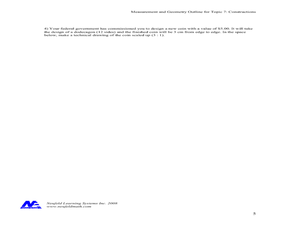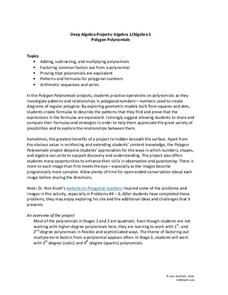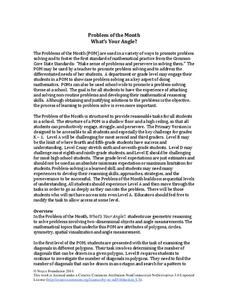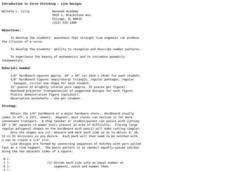Curated OER
Exam One Review
In this secondary mathematics activity, students solve problems that involve patterns, arithmetic and geometric sequences, geometric logic and reasoning, and changing bases. The three page activity contains fourteen problems. Answers...
Curated OER
Geometric Patterns
Students explore geometric patterns. Given three straws of various sizes, students conduct tests, and search for patterns, to determine if the various sizes would form a triangle. They use the Triangle Inequality Theorem to determine...
Curated OER
Pattern Using Unit Cells
Students explore the pattern of the unit cell. In this science lesson, students color the unit cells on a worksheet and create a pattern using unit cells.
Curated OER
Constructing Geometric Shapes
In this construction geometric shapes worksheet, student use the software program for instruction then construction shapes and bisect angles for four questions.
Curated OER
Matchstick Math: Using Manipulatives to Model Linear, Quadratic, and Exponential Functions
Playing with matches (unlit, of course) becomes an engaging learning experience in this fun instructional unit. Teach pupils how to apply properties of exponential functions to solve problems. They differentiate between quadratic and...
Illustrative Mathematics
Kitchen Floor Tiles
An interesting way to look at the kitchen floor is to count the number of tiles in the border. Fred starts with four white floor tiles and writes an expression for the number of tiles needed for the colored border. Algebra learners are...
Concord Consortium
Bricks for Books
Maximize a profit with an understanding of geometric dimension. A real-world task challenges learners to design a pattern using three different brick shapes. The bricks are dedicated with a different donation for each shape, so part of...
Curated OER
Soft Sculpture Birds
Art can mimic life, and animals are always interesting subjects. Learners create large soft sculptures (stuffed) birds using paper, paint, and other basic collage materials. They view images of birds, and discuss bird traits and shapes....
5280 Math
Polygon Polynomials
Patterns in polygons lead to patterns in polynomials. Presented with a series of polygons, individuals create polynomial expressions to represent their patterns. The algebra project consists of nine problems that incorporate polynomial...
West Contra Costa Unified School District
Writing Exponential Functions Based on Data
Give your class a concrete example of exponential growth and decay using this hands-on activity. These Algebra II lessons allow for the exploration of exponential growth and decay models, as well as the discovery of the patterns of each....
CK-12 Foundation
Visual Patterns: Building the Queen's Tower
A resource fit for a queen. Scholars recognize and continue a pattern in towers people are building for a queen. They write and use an algebraic expression for the number of tiles in the towers.
Teach Engineering
Discovering Relationships Between Side Length and Area
Consider the relationship between side length and area as an input-output function. Scholars create input-output tables for the area of squares to determine an equation in the first installment of a three-part unit. Ditto for the area of...
EngageNY
Multiplying and Factoring Polynomial Expressions (part 2)
If you can multiply binomials, you can factor trinomials! This is the premise for a instructional activity on factoring. Pupils look for patterns in the binomials they multiply and apply them in reverse. Examples include leading...
Mathematics Vision Project
Circles and Other Conics
Through a variety of hands-on activities and physical scenarios, this far-reaching unit leads learners through an exceptionally thorough exploration of circles and parabolas as conic sections. Geometric construction techniques are used...
Noyce Foundation
Miles of Tiles
Create number sentences and equations to solve geometric problems. Each activity in the series of five asks young mathematicians to consider different-sized tiles to build structures according to specific criteria. The first activities,...
Noyce Foundation
What's Your Angle?
Math can be a work of art! Reach your artistic pupils as they explore angle measures. A creative set of five problems of varying levels has young learners study interior and exterior angle measures of polygons. The introductory levels...
Curated OER
Arithmetic Sequences
Find the sequence of an equation with your math super stars. They differentiate between arithmetic and geometric sequences and then calculate the sum of finite and infinite sequences.
Curated OER
Introduction to Curve Stitching - Line Designs
Students develop their awareness that straight line segments can produce the illusion of a curve and helps them recognize and describe number patterns and geometric fundamentals.
Curated OER
Mathematics: Technology and Connections
Sixth graders interpret and replicate patterns. In this patterns lesson, 6th graders are given an item with a definite pattern which they must replicate using a calculator or computer and then justify how they relate. Students listen to...
Curated OER
Patterns In Hexagon Tables
Sixth graders construct a rule about the number of sides found in a pattern of hexagons. In this mathematical problem solving lesson, 6th graders observe different hexagon patterns and create a rule about the relationship between the...
Curated OER
Leaves, Flowers, Seashells, Mirrors and Symmetry
Students develop an understanding of patterns and symmetry. In this symmetry and pattern lesson, students use real world patterns then analyze and extend them. Students also use real world items while discovering and observing symmetry.
Curated OER
Converge or Diverge?
Students prepare for the calculus concepts of limits by examining sequences that converge and diverge. By using an Excel program that generates sequences, students manipulate the starting number, multiplier and add-on values, and examine...
CK-12 Foundation
Sums of Finite Arithmetic Series: Triangular Numbers
Using a slider, scholars build triangular numbers and their associated rectangles and use the geometric display to find the pattern to determine the next triangular number. They then relate that number to the area of the rectangle to...

























